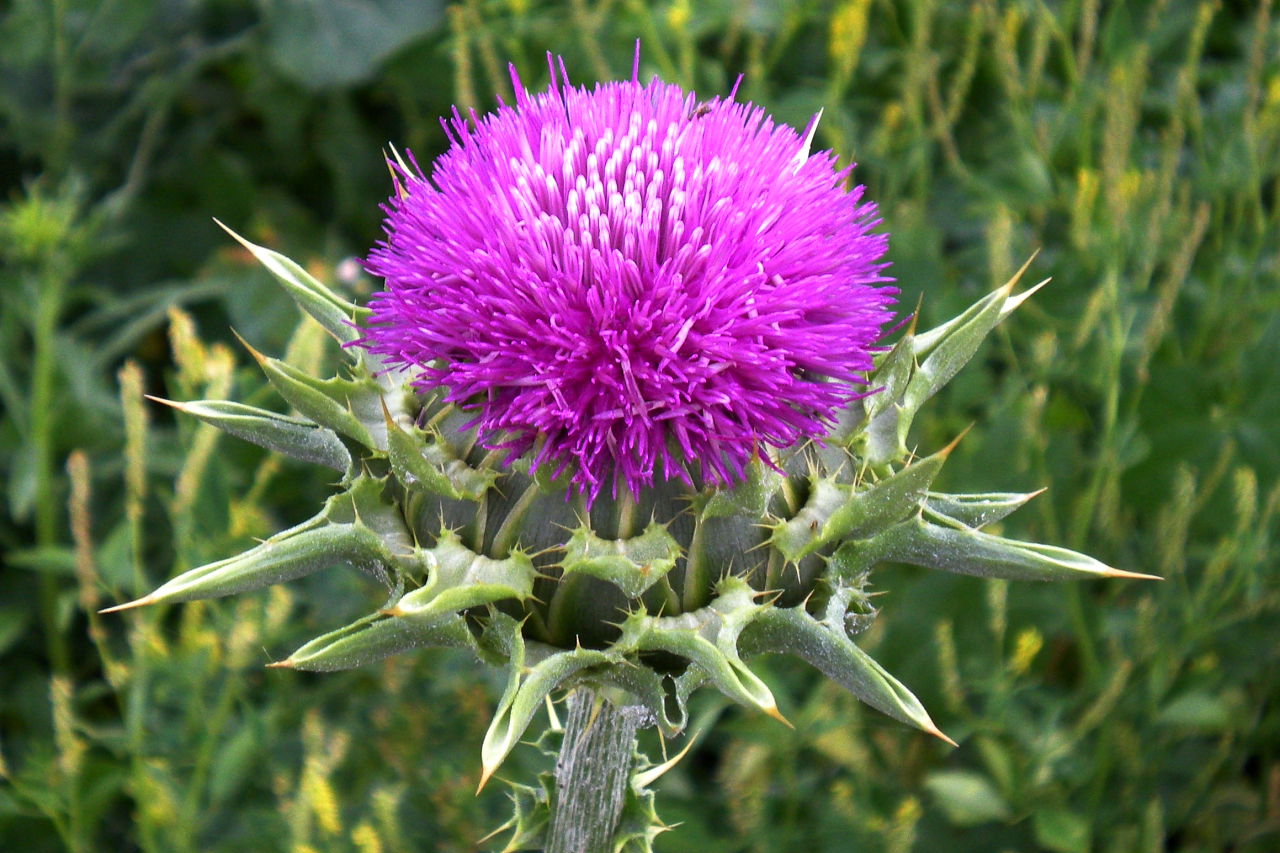Milk thistle extract is synthesized from the fruit known as achenes, which comes from the Silybum marianum plant. Like a sunflower seed, achene is a single seed, surrounded by a wall. Majority of milk thistle extracts have approximately 70%-80% of the active ingredient know as silymarin.
This supplement got its name from the milky sap, which comes out of the leaves of this plant once snapped off. It has been used for many years, treating issues with the gallbladder and liver. The plant itself is used as a food source.
The leaves (once trimmed), can be boiled and used in substitution of spinach. You can eat these leaves raw with their flowers, tossing them into a salad. The roots can also be eaten raw or cooked, but are often boil or roasted. You can even stew the stems. Once they have soaked overnight, you can reduce bitterness.
Throughout history, many women have consumed milk thistle, in order to increase milk secretion. While focusing on more modern medicinal practices, milk thistle has been used to treat liver disorders, melancholia, and depression.
What Can Milk Thistle Be Used For?
As a supplement, milk thistle is typically sold in 200 mg capsules. Within a 200 mg capsule, there is typically around 140 mg of silymarin. When purchasing, ensure that the extract was produced from the hard fruit of the plant. Some manufacturers are producing supplements from milk thistle leaves, while evidence shows that silymarin is found specifically in the fruit, which contains the seed.
When preventing liver damage based on chemicals and toxins in one’s environment, milk thistle is a great option. It also has key applications for chronic inflammatory liver disease, jaundice, cirrhosis, and hepatitis. Other common uses are for complications such as gallbladder issues, loss of appetite, heartburn, spleen diseases, allergies, malaria, prostate cancer, hangovers, and more.
The Role of Silymarin
As mentioned the primary active compound in milk thistle is silymarin. It is actually a flavonoid group, composed of silidianin, silicristin, and silibinin. This group works together, helping to repair damaged liver cells. This group of flavonoids have anti-oxidant effects, helping protect users against damage caused by alcohol or other toxins.
Traditionally, milk thistle extract was taken as an antidote for poisonous mushrooms. When individuals accidentally consumed the ‘deathcap’ mushroom, the toxic effects occurred quickly. If this mushroom was followed by milk thistle extract within ten minutes, toxicity was completely prevented. If consumed 24-hours after ingesting the mushroom, liver damage was much less severe. These positive effects have now been confirmed through various animal studies.
The Key Benefits of Milk Thistle
A mixture of milk thistle, peppermint, dandelion, artichoke, and boldo, have been noted as a liver tonic, detoxifying for hangovers, as well fat metabolism. For the average adult, they will typically take 15-20 drops, twice daily (within water).
When you suffer from a damaged liver, you will often experience bad menstrual cycles, skin issues, weight gain, lethargy, and experience difficulties regulating temperature. When attempting to detox your liver, it’s best to avoid coffee, fatty and sugary foods, dairy, fried food, and alcohol.
Studies have shown that milk thistle extract can be used in combination with an antihistamine. The symptoms of allergies are generally reduced more, than when taking just an antihistamine on its own. It is also often combined with a variety of other herbs, so that users can reduce acid reflux, cramping, nausea, vomiting, and stomach pain.
For those that experience bad menstrual cycles, milk thistle can treat symptoms like hot flashes and night sweats. It is also found in a skin cream, which is used to prevent skin lesions from radiation regarding breast cancer.
Other evidence has shown that when taking silymarin, it has the ability to reduce one’s blood sugar levels, as well as cholesterol, and triglycerides. For those that have kidney disease, milk thistle may also assist you.
Milk thistle works by increasing haemoglobin levels, which is the protein in red bloods cells that carry oxygen. This is recommended for users who are undergoing hemodialysis. Of course speak with your doctor before starting your first dose to ensure that this supplement is right for you.
Is Milk Thistle Safe?
If you are currently taking medication that is metabolized in the liver, side-effects may increase. This is due to possible interactions. These medications include, but are not limited to:
- Amitriptyline (Elavil)
- Diazepam (Valium)
- Zileuton (Zyflo)
- Celecoxib (Celebrex)
- Diclofenac (Voltaren)
- Fluvastatin (Lescol)
- Glipizide (Glucotrol)
- Ibuprofen (Advil, Motrin)
- Irbesartan (Avapro)
- Iosartan (Coozaar)
- Phenytoin (Dilantin)
- Piroxicam (Feldene)
- Tamoxifen (Nolvadex)
- Tolbutamide (Tolinase)
- Torsemide (Demadex)
- Warfarin (Coumadin)
- Glucuronidated Drugs
Since estrogen can interact with this supplement, it should not be taken with Statins. If you are pregnant or breastfeeding, please refrain from using milk thistle. If you are allergic to the Asteracease Compositae plant family, do not take milk thistle. This includes daisies, avocados, and ragweed. As it could cause anaphylactic shock, so please be aware.
If you are a women with uterine, ovarian, or breast cancer, please refrain from taking this supplement. The same is true for those that suffer from endometriosis. You should also not use this supplement if you are taking any other supplements or herbs, which lower your blood sugar. This include bitter melon, Siberian ginseng, garlic, fenugreek, psyllium, and more. As always, check with your doctor before using.
